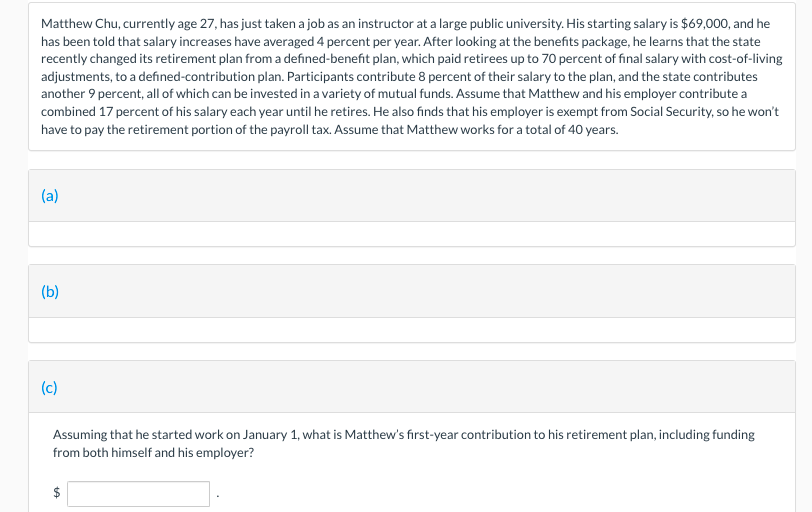
Matthew Chu, currently age 27, has just taken a job as an instructor at a large public university. His starting salary is $69,000, and he has been told that salary increases have averaged 4 percent per year. After looking at the benefits package, he learns that the state recently changed its retirement plan from a defined benefit plan, which paid retirees up to 70 percent of final salary with cost-of-living adjustments, to a defined-contribution plan. Participants contribute 8 percent of their salary to the plan, and the state contributes another 9 percent, all of which can be invested in a variety of mutual funds. Assume that Matthew and his employer contribute a combined 17 percent of his salary each year until he retires. He also finds that his employer is exempt from Social Security, so he won't have to pay the retirement portion of the payroll tax. Assume that Matthew works for a total of 40 years. (a) (b) (c) Assuming that he started work on January 1, what is Matthew's first-year contribution to his retirement plan, including funding from both himself and his employer? $ Matthew Chu, currently age 27, has just taken a job as an instructor at a large public university. His starting salary is $69,000, and he has been told that salary increases have averaged 4 percent per year. After looking at the benefits package, he learns that the state recently changed its retirement plan from a defined benefit plan, which paid retirees up to 70 percent of final salary with cost-of-living adjustments, to a defined-contribution plan. Participants contribute 8 percent of their salary to the plan, and the state contributes another 9 percent, all of which can be invested in a variety of mutual funds. Assume that Matthew and his employer contribute a combined 17 percent of his salary each year until he retires. He also finds that his employer is exempt from Social Security, so he won't have to pay the retirement portion of the payroll tax. Assume that Matthew works for a total of 40 years. (a) (b) (c) Assuming that he started work on January 1, what is Matthew's first-year contribution to his retirement plan, including funding from both himself and his employer? $







